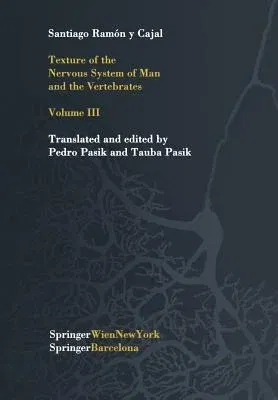The third volume and the other two volumes (Volume 1 available, Volume 2
due december 1999) offer the scientific community the works and thoughts
of Santiago Ramón y Cajal by the faithful rendition of the original
Spanish version of the Texture of the Nervous System of Man and the
Vertebrates (1899-1904), with additional facts contained in the French
translation (1909-1911). These non-English versions are being quoted an
average of 200 times yearly in the scientific literature. The collection
will represent the "definitive Cajal" to be used by scientists and
scholars interested in the original thoughts of probably the most
prominent neuroscientist of all times. Unique features of the present
work include: - Only authorized English translation of the original
Spanish text, adhering as much as possible to the letter, with
correction of the obvious errors already predicted by Cajal in his
Preface. - Added facts appearing in the French version, with correction
of old as well as new errors, the latter probably due to inaccuracies in
translating into French some nuances of the Spanish language. - Uniform
of nomenclature according to contemporary scientific English. -
Annotations on Cajal's changing concepts over time, the elucidation of
certain structures that do not have present day equivalents, and
explanations of the many symbols appearing in illustrations but not
mentioned in the corresponding original legends. - Most illustrations
are reproductions of Cajal's original art work, still extant at the
Cajal Museum in Madrid, with cross references to figure numbers of the
Spanish and French versions. - Citations are given by author and year in
the text, with an alphabetical list at the end of the volume, completed
and corrected for accuracy against original publications. - Taxonomy
glossary of species appearing in the text, with present scientific
names, and their colloquial English counterparts. In sum, the collection
represents the "definitive Cajal" to be used by scientists and scholars
interested in the original writings of probably the most prominent
neuroscientist of all times.


